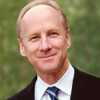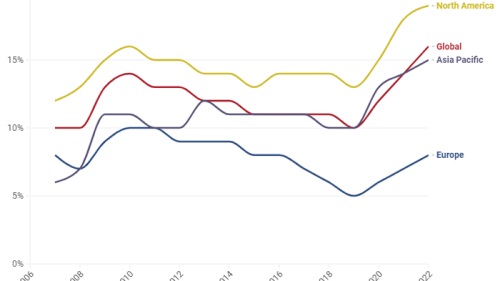As fiscal year 2016 comes to a close, I’m happy to report that the state of ULI is strong. Our recent Spring Meetingin Philadelphia brought nearly 3,600 members to the city for an outstanding program, and our sponsorships and attendance exceeded our expectations, providing a substantial boost to what has already been an impressive year overall for the Institute.
Our membership is growing significantly: we are approaching the 40,000 mark—about where we were before the financial crisis. Even better, as we’ve recovered our membership, we’ve built a much more durable and diverse ULI. We have a broader geographic reach and a much stronger district and national council network. And, through our Global Evolution Initiative, we are creating a structure that strengthens and better connects the global and local aspects of ULI. To help accomplish this, we have made a series of governance adjustments; we are retooling the executive staff team to improve communications and streamline our operations; and we are developing a new process for planning and allocating resources.
This initiative is an investment in ULI’s future, and it is driven by our goal to make it easier for you to connect and contribute to the organization. It is an initiative that reflects a strong and confident organization, the relevance of ULI’s mission, the breadth and commitment of our membership, and the tremendous on-the-ground impact of our programs, especially those delivered through the district and national councils. We want to make the organization more transparent and more consistent in its operations, and ultimately more relevant and more valuable to you.
ULI’s evolution also involves improvements to the product council network. We have innovative new programs in place to introduce younger members and public sector members to our product councils, and to invigorate the programming of the councils themselves. For instance, at the Spring Meeting, we had more than 400 council guests: these are the people who provide the human capital for new growth in the council program, whether it’s establishing new flights or exploring new topics and opportunities. In addition, we are seeing existing council members becoming much more involved with other areas of the Spring and Fall Meetings; this is evident in the increased linkage with the other member networks.
Of course, we are continuing to honor the integrity and programmatic autonomy of the councils, but we want to take better advantage of the councils’ intellectual capital, capturing more of the content from the councils to drive ULI’s program of work and to create impact through alliances and affiliations with the district councils. As part of our new staff structure, we will be emphasizing key connections between the product and district councils.
In addition to the governance changes we are making to improve ULI’s operations, we are focusing more intently on two areas with broad implications for the industry in terms of investing in, building, and managing the urban environment.
The first revolves around technology—a big topic with many dimensions that affect our members and their businesses. While we are certainly interested in the aspects of technology that improve the efficiency of your business operations, we are also very interested in the city-building aspects of technology. We hear a lot about the implications of the sharing economy and autonomous vehicles, but equally significant are the implications for infrastructure investment and public service delivery. We also expect that technology can lead to land use regulations that are more about performance and less about specifications—which will allow for more product innovation. We have held a series of forums to explore this topic, and you can look forward to technology becoming more prominent in ULI’s program of work.
The second area emerging for us is city building as a catalyst for social equity. As this real estate cycle matures, the beneficial impacts on our cities have been substantial. The recent changes in our cities and our industry are profound, and we are familiar with the major drivers—changing demographics, better public services, falling crime rates, and innovative development practices from both the public and private sectors. We see new products, more flexible regulations, and more strategic public investment.
But it is equally clear that the benefits of all this are not equitably distributed. It is perhaps most visible in the housing affordability challenge faced in most of our major markets and the attendant political stress revolving around urban housing and mixed-use development. Debates about change and neighborhood gentrification often take on a zero-sum characterization, focusing on winners and losers instead of the common ground we share. As industry leaders, it is up to us to help find solutions and models that can be used to trigger investment in cities and help achieve better outcomes for a broader cross section of our population. This is an area that we will be exploring more fully in the months ahead.
As ULI continues to evolve, we will be operating from a new headquarters location in the downtown core of Washington, D.C. By the time you are reading this, we will be settling into a new workplace, contemporary in both its visual and operational characteristics. This new space is consistent with what ULI stands for: it is transit friendly, and it is a workplace that can adapt to accommodate changes in work styles, workforce demographics, and technology. And, most important, it represents a careful use of your resources. We have carefully managed our design and construction costs, and we will be delivering the space well under budget and ahead of schedule. This new space is designed specifically with you—our members—in mind. We look forward to welcoming you to ULI’s headquarters when you are in Washington.
Thank you for supporting ULI and reinforcing the Institute’s reputation as the global voice for leadership in land use. It is a privilege to work with each of you to deliver ULI’s mission in our communities every day.





